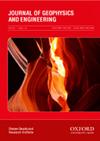堆栈前采集优化的集成工作流
IF 1.7
3区 地球科学
Q3 GEOCHEMISTRY & GEOPHYSICS
引用次数: 0
摘要
高质量的地震数据有助于提高复杂储层的预测精度。目前,有几种提高叠前采集分辨率和信噪比的方法。同时,为了避免错误的地震解释,我们必须评估处理后的资料是否保持其原始特征和可靠性。本文建立了共反射点(CRP)集束优化的集成工作流程,该流程分为加工和质量控制两部分。在此基础上,总结了综合质量控制手段,并说明了其在各个环节中的具体意义。数据处理包括采集平坦化、信噪比增强、能量补偿和分辨率提高四个部分。同时,利用测井数据、正演模拟、叠加数据、反演等方法,保证了处理后的数据得到优化,并保持了数据的原始特征。在碳酸盐岩储层CRP数据集中的应用表明,该工作流程可以全面优化叠前地震数据,提高信噪比和分辨率。重要的是,质量控制保证结果提高了储层预测的准确性,并增强了与井资料的相关性。本文章由计算机程序翻译,如有差异,请以英文原文为准。
An Integrated Workflow for Pre-stack Gather Optimization
Abstract High-quality seismic data contribute to improving the prediction accuracy of complex reservoirs. Currently, there are several methods for enhancing pre-stack gather resolution and signal-to-noise ratio (SNR). Meanwhile, to avoid incorrect seismic interpretation, we must evaluate whether the processed data maintains its original characteristics and reliability. This paper establishes an integrated workflow for optimizing common-reflection-point (CRP) gather that is divided into processing and quality control. Furthermore, we summarize the comprehensive quality control means and explain their specific significance in each step. Data processing includes four parts: gather flattening, SNR enhancement, energy compensation, and resolution improvement. Simultaneously, we use well log data, forward simulation, stack data, and inversion to guarantee the processed data is optimized and keeps its original characteristics. Applications in carbonate reservoir CRP gathers demonstrate that this workflow can comprehensively optimize pre-stack seismic data and improve SNR and resolution. Importantly, the quality controls guarantee results have improved accuracy in reservoir prediction and stronger correlation coefficients with well data.
求助全文
通过发布文献求助,成功后即可免费获取论文全文。
去求助
来源期刊

Journal of Geophysics and Engineering
工程技术-地球化学与地球物理
CiteScore
2.50
自引率
21.40%
发文量
87
审稿时长
4 months
期刊介绍:
Journal of Geophysics and Engineering aims to promote research and developments in geophysics and related areas of engineering. It has a predominantly applied science and engineering focus, but solicits and accepts high-quality contributions in all earth-physics disciplines, including geodynamics, natural and controlled-source seismology, oil, gas and mineral exploration, petrophysics and reservoir geophysics. The journal covers those aspects of engineering that are closely related to geophysics, or on the targets and problems that geophysics addresses. Typically, this is engineering focused on the subsurface, particularly petroleum engineering, rock mechanics, geophysical software engineering, drilling technology, remote sensing, instrumentation and sensor design.
 求助内容:
求助内容: 应助结果提醒方式:
应助结果提醒方式:


